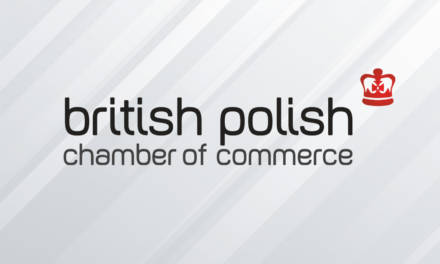
By Michael Dembinski, chief advisor, and Dorota Kierbiedź, membership director, BPCC
This issue of Contact Magazine Online looks at finance. BPCC members write about finance from their perspectives from across different sectors. Five key threads have emerged from their contributions to this issue:
- Green finance – if the money you borrow can be shown to have beneficial effects for the climate when it comes to greenhouse-gas emissions – it will be cheaper. If not – it will cost you more. How will affect supply chains?
- Artificial intelligence will shake up the accountancy profession. Who will be the winners, who will be the losers? How should businesses prepare for the coming AI revolution?
- Human resources – it seems to be increasingly difficult to recruit financial specialists in Poland. What’s the answer?
- Export finance – Poland has become one of Europe’s export powerhouses. How is export financed? How do SMEs and global corporates based in Poland reach for the money needed to expand abroad?
- Taxation is rapidly catching up in terms of digitalisation. Ultimately, it will make settling tax easier, but there will be pain on the way for businesses as new processes need to be implemented. Will it make Poland a more attractive place to do business?
But before we get to those, we have three headline interviews in this issue…
The British model of training, examining and certifying accountants has become common worldwide. Agnieszka Jarosz, head of ACCA Northern and Eastern Europe, talks about how the organisation is adapting to the rapidly changing demands that face accountants.
SMEs have specific financing needs. Bibby Financial Services has long served this market. Tomasz Kukulski, chairman of the board of its Polish subsidiary, discusses the opportunities and challenges of financing small- and medium-sized businesses in Poland.
What is the current climate for investment in Poland like? Dariusz Kucharski, CEO and country head of commercial banking at HSBC in Poland describes trends he is observing, such as ESG and green finance, and the near-shoring of operations to this market.
Green finance
We have two perspectives on this issue – one from a banker, one from a lawyer. Michał Szalast-Dao Quy, head of the Sustainable Finance Team at BNP Paribas Bank Polska considers the role of financial institutions in sustainable transition, focusing on the challenges associated with implementing the European Green Deal and meeting climate targets require sustainable investments. And how the ESG-related regulatory requirements for financial institutions may impact their counterparties is explained by Marcin Krzemień from CMS, who takes a lawyer’s look at the role of the financial sector in the EU journey toward climate transformation
The future of accountancy is AI
AstraZeneca’s Katarzyna Malarek-Penkala writes a fascinating piece in which she balances the current difficulties faced when recruiting accountancy specialists with the promises that AI offers in terms of streamlining routine tasks. This theme is also taken up by Piotr Kubalka, CEO of the J. Dauman Group, who points out that AI will automate almost all of accountants’ routine tasks, allowing them to focus on advisory work that adds greater value to their clients’ businesses. Data analytics and business intelligence will be the focus after the AI revolution, says Izabela Kuśmierz-Latała, CEO at Crowe Poland, Czechia and Slovakia; “AI-based solutions will streamline processes, increase efficiency and improve data accuracy.”
The Human Resources aspects of finance and accountancy
Many people in the accountancy/finance area work remotely. The law in Poland regarding remote work has changed recently; Marta Michalik from the KR Group has prepared this guide explaining what the new regulations will mean in practice for employers. Many global corporates have set up shared finance operations in Poland, leading to a shortage of skills in this area. Justyna Chmielewska from Hays Poland explains how to set about talent-hunting for finance specialists as demand outpaces supply. If you have trade union(s) within your organisation, you may, as an employer, be doing more for them than the law expects – indeed, you may be doing more than the law allows. This, from Michał Bodziony, Kinga Ciosk and Kamil Bogusz from PCS Paruch.
Financial support for exporters
Poland’s exports of goods and services remain robust. And the UK, despite Brexit, is still an important market for Polish exporters. The next set of articles cover some of the financial challenges associated with trading with the UK in current conditions. Brexit has dealt a serious blow to e-commerce between the UK and firms in continental Europe, for whom the British online market was particularly attractive. Jakub Makurat, CEO of Ebury for Poland, Czechia, Slovakia and the Baltics, sets out useful tips for selling profitably from Poland to British consumers via online channels. Piotr Stolarczyk from Bank Pekao SA presents an overview of Poland’s success in export markets and international expansion, outlining the importance of banking support – and takes a specific look at the UK market. Brexit has meant that Polish firms are opening offices in the UK, but this still leaves them with the problem of currency exchange. Konrad Sterenczak from Privalgo suggests how to cut costs and save time when it comes to international payments.
Taxation goes digital – it will be easier, but first – some pain
The Polish government is introducing new IT tools for communication between taxpayers and the tax administration. Anna Derdak from Kancelaria Prawna Schampera, Dubis, Zając i Wspólnicy considers what this will mean for tax compliance. Implementation of KsEF (e-invoicing) and JPK (structured tax files) fills many finance departments with dread. Aneta Bolka from Roedl & Partner casts an eye on the roll-out of tax digitalisation and highlights the pain-points ahead for businesses large and small. Marzena Richter of Staniszewski & Richter compares the tax and social-security regimes in the UK and Poland to see which economy is more competitive when it comes to foreign investment – and the factors that will drive growth in Poland in future. Poland has been ranked fourth-least business-friendly country in Europe in a ranking conducted by TMF Group. “Polish accounting and tax regulations are among the most complex. Investors operating in many markets, including the most business-friendly ones, are accustomed to focusing most of their energy on their core business rather than finding their way through the complexities of regulation,” says Joanna Romańczuk, TMF Group’s director for CEE.
How Poland is perceived by global investors is seen the latest edition of KPMG’s Investment in Poland. A rough guide to successful investing in Poland, a comprehensive report providing crucial information to foreign investors considering doing business in Poland.
Law firm Kochański & Partners’ Marek Król reviews Poland’s current attractiveness to foreign businesses seeking an EU location, considering the factors that sway investment decisions.
Finally, a round-up of other articles published in this edition of Contact Magazine Online…
Adrian_Andrychowski from JDP Law looks at the phenomenon of mass consumer claims against banks – and wonders if this poses an investment opportunity for law firms and litigation funds.
Firms considering cross-border provision of payment initiation services will find that the process is not that easy – Małgorzata Gołębiowska from Osborne Clarke, navigates the murky waters.
And to round off this issue – an intellectual challenge from Marek Gołębiowski at sherlock7: can you help a CEO find a way to increase the profitability of his firm during a time of steep inflation?
NEW TO CONTACT MAGAZINE ONLINE – REGULATORY OVERVIEW WITH THE BPCC’S NEW REGULATORY AFFAIRS MANAGER, MAGDALENA STANILEWICZ.



























